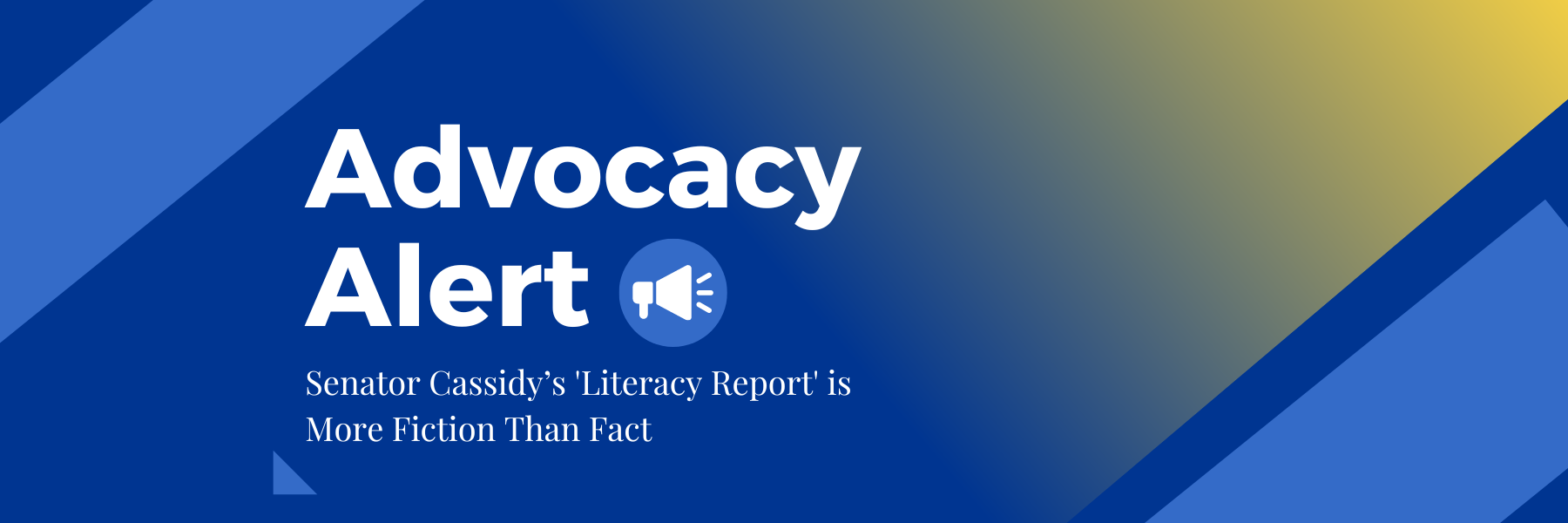BLOG
Advocacy Alert: Senator Cassidy’s ‘Literacy Report’ is More Fiction Than Fact
Another day and another dubious report is making headlines. This time, it’s U.S. Senator Bill Cassidy (R-LA) stirring the pot with some suspiciously biased findings on literacy rates among American students. Too bad his report is about as reliable as a soggy paperback left out in the rain.
Let’s dive in: Cassidy kicks things off with the bold claim that “Two-thirds of America’s fourth and eighth graders are not proficient in reading.” Sounds alarming, right? Yes – it’s as alarming as it is misleading. In classic “Fake News” fashion, Sen. Cassidy repeats this overblown talking point despite it having been debunked repeatedly by scholars and news outlets alike. To take it a step further, Sen. Cassidy wrote an entire diatribe based on this fallacy and dressed it up for pearl-clutching, teacher-blaming, and union-demonizing.
A quick glance at the report’s footnotes reveals a veritable who’s who of questionable sources. Because nothing says “reliable data” like a headline from your favorite biased news outlet, Cassidy cites PR-spun news articles from the Washington Times and conservative think tanks ExcelinEd and Fordham.
But where’s the science, Senator? This report offers a glaring lack of credible research on reading or reputable analyses of NAEP data. It’s not as though the need for comprehensive balanced literacy instruction hasn’t been heavily researched by Evidence for ESSA, the What Works Clearinghouse, and any number of qualitative and quantitative research studies. Not only that, but there is also the obvious dearth of research supporting Sen. Cassidy’s reform recommendations to align with the heavily politicized SOR narrative. As Dr. Maren Aukerman stated in a recent presentation: “There is no evidence that balanced literacy created a big crisis, nor that more phonics is changing things at a national level. …The pink line shows when Science of Reading legislation takes off. That’s actually when things stopped improving – even before COVID.” (As an aside, I highly recommend Sen. Cassidy and all concerned with literacy listen to Aukerman’s webinar for Real Talk about what the science actually says!)
So why the lack of research-based citations? Could it be that the real research doesn’t match the suspiciously for-profit narrative that’s been the hallmark of the latest “Science of Reading” movement? Yes. Exactly that.
Also tucked neatly within this ill-informed condemnation of literacy best practices is a pointed dig at RRCNA for its Ohio lawsuit against his fellow education-bashing republican Gov. DeWine’s Literacy Curriculum Statute. Here’s my hot take: when junk science is used to justify legislative action that harms schools, teachers, and students, it is our obligation to take action. As I’ve said before, RRCNA will fight for evidence-based reading instruction as defined by educators and research — not politicians and corporate interests. I encourage all educators who know what’s best for kids to stand with us.
By insinuating that teachers can’t or won’t teach kids to read, Sen. Cassidy misses a golden opportunity to back real solutions that would have a meaningful impact on the nation’s literacy rates. He could have used his platform to champion reforms with known impact: smaller class sizes, improved learning conditions, addressing socioeconomic factors, and teacher professional development. Alas, he prioritized the same tried-and-failed methods that noneducators often suggest: more government oversight, mandated testing, and scripted one-size-fits-all curriculum. Have those ever worked? Nope.
From the lack of credible research to the decidedly anti-teacher rhetoric, Sen. Cassidy seems to bank on the assumption that America will swallow his word salad without looking at the ingredient list – and that’s where you come in.
As literacy educators, experts, and advocates, we have the power and the obligation to call out this tomfoolery. So, grab your keyboards and help bombard the Senate Committee on Health, Education, Labor, and Pensions with the facts about literacy education. Visit RRCNA’s Act Now page and use our simple advocacy tools to share our prewritten letter or your own story by the April 5th deadline.
In the meantime, let’s all agree to stick to the facts, shall we? After all, when it comes to the critical importance of literacy rates, U.S. children, teachers, and schools deserve more than just a tall tale spun by a politician with an agenda.

Dr. Billy Molasso is the Executive Director of the not-for-profit Reading Recovery Council of North America.
Citations:
Aukerman, M. (2024, February 22). Toward comprehensive, research-informed literacy instruction: Thinking with, against, and beyond the science of reading. [Webinar]. Ithaca College Department of Education 2024 Educational Freedom Lecture and Community Read. https://media.ithaca.edu/media/Maren+Aukerman+2024+Ithaca+College+Educational+Freed
Cassidy, B. (2024). “Preventing a Lost Generation: Facing a Critical Moment in Students’ Literacy [PDF]. Retrieved from https://www.help.senate.gov/imo/media/doc/literacy_report.pdf.
Evidence for ESSA. Reading Programs. Retrieved from https://www.evidenceforessa.org/programs/reading/.
Greene, Peter. “The Most Misused Statistics in Education.” Forbes, 16 Mar. 2023, www.forbes.com/sites/petergreene/2023/03/16/the-most-misused-statistics-in-education/?sh=c00c20b57926.
Institute of Education Sciences. What Works Clearinghouse. Retrieved from https://ies.ed.gov/ncee/wwc/
Loveless, T. (2019, September 26). The NAEP proficiency myth. Brookings Institution. https://www.brookings.edu/articles/the-naep-proficiency-myth/.
Reading Recovery Council of North America. Research Article Database. Retrieved from https://readingrecovery.org/resources/research-article-database/.
Thomas, Paul. (2024, February 23). Big lies of education: Reading proficiency and NAEP. Radical Scholarship. https://radicalscholarship.com/2024/02/23/big-lies-of-education-reading-proficiency-and-naep/.
THE JOURNAL OF READING RECOVERY
Spring 2025
OPEN ACCESS: Centering Children and Working Towards Equity: Teaching All Children to Read by Catherine Compton-Lilly
Literacy Leadership in Support of Equity: Whatever It Takes by Allison Briceño
Exploring the Purposes, Power, and Potential of Familiar Reading by Jamie Lipp
Full Circle: From Student to Psychologist by Joyce Romano





